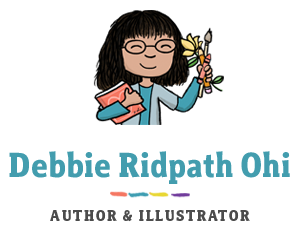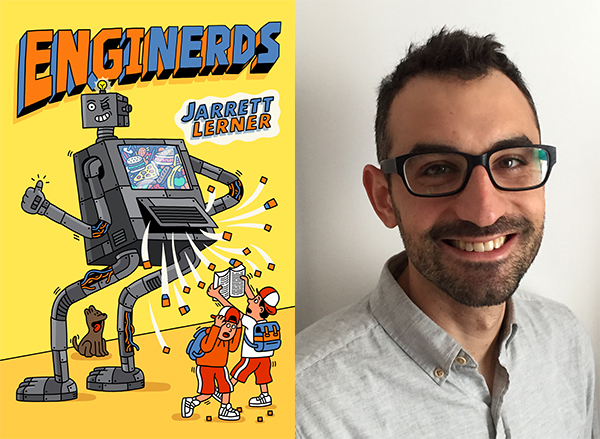
Jarrett Lerner writes books about farting robots, belching knights, and other serious matters. You can find him online at jarrettlerner.com and on Twitter at @Jarrett_Lerner. You can also often find him at the mgbookvillage.org, which he cofounded and helps run. He lives with his wife, his daughter, and a cat in Medford, Massachusetts.
I first encountered Jarrett on Twitter, where he is an enthusiastic champion of kidlit. When I asked him about ENGINERDS, I loved that he made sure to give credit to the illustrator, Serge Seidlitz, who did the cover and spot illustrations inside the book. Yay for authors who appreciate their illustrators!
Synopsis of ENGINERDS (Simon & Schuster/Aladdin, 2017, for ages 8-12):
“How awesome would it be to have a robot? For twelve-year-old Kennedy, dreams come true when a beat-up old box arrives on his doorstop. Inside is a robot named Greeeg, but he’s not exactly your typical bot: first he assembles himself. And when he devours a refrigerator full of food, his rear end turns into a cube-firing butt. Extraordinary dreams become hair-raising, hilarious nightmares in Jarrett Lerner’s action-packed novel about a group of super-smart, super-nerdy friends who find themselves battling a gang of ravenous rogue robots who just might have a plot to take over the world.”
Q. Could you please take a photo of something in your office and tell us the story behind it?
This card was made by Ashley Leath, a friend and fellow writer who operated a letterpress business for a while. She said these words in conversation – on Twitter, over email, I forget exactly where – and I said that they deserved to be on a card of their own. Well, she put them on one, and then I bought a copy of the card and “sent” it to myself.
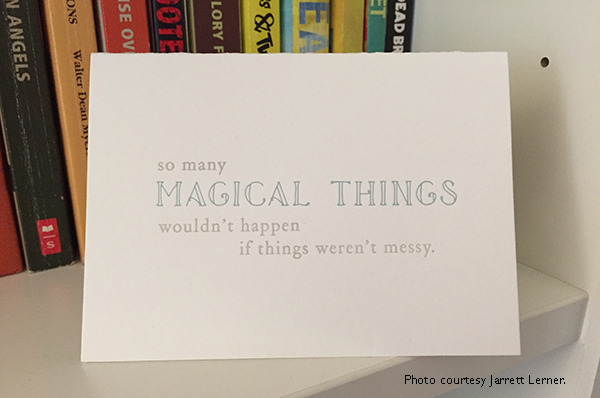
I keep the card on a bookshelf in my study, right in my line of sight when I’m sitting at my desk. When I’m starting on a new project, the words remind me to let myself make mistakes (see my answer to the next questions for more on that). When I’m further along on a project, the words remind me to be playful, to take risks, to let my imagination lead me where it wants to go – even if, later on, I decide that it’s a place I don’t need or want to be.
I think a lot of writers – and creators in general – are perfectionists. And sometimes, that’s helpful. Sometimes, it’s even necessary. But embracing the magical messiness of life, and letting that infuse your art, can be an exhilaratingly liberating thing. It has led to some of my best work, and many hugely helpful discoveries about my process. There’s a time for perfectionism and a time for loose, wild impulsiveness. Ashley’s card helps me find a good balance between the two.
Q. What advice do you have for young writers?
When talking with young writers, there are a few things I always stress. One is reading. I read as much as, if not more than, I write. Encountering other people’s ideas is a surefire way of getting your imagination searching for ideas of its own, and books are an amazing place to find other people’s ideas – typically people fill books with their very best. Reading also offers you an opportunity to reflect on your own writing. I encourage kids to pay attention to what other authors do, to consider why they might have chosen to do things in that particular way, and then to ask themselves if they would’ve done it that way as well. Why or why not? How might a different approach change the reader’s experience of the story?
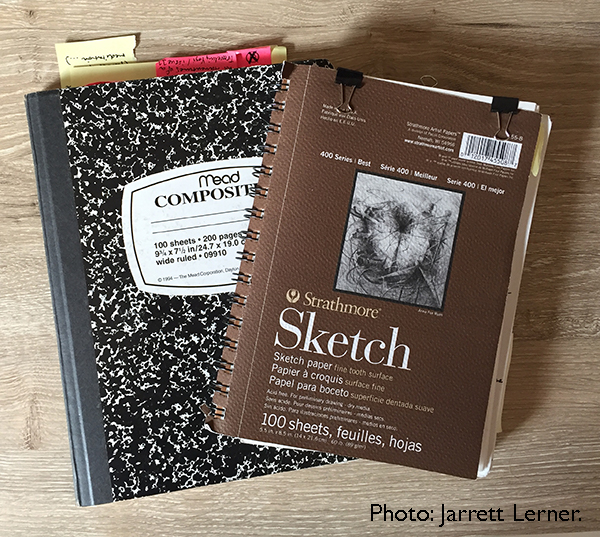
Another thing I always tell young writers: to get comfortable making creative mistakes, and then to go out and make a whole bunch of them. When I visit schools, either virtually or in person, I always show kids some of my first drafts. I start most of my projects longhand, in composition notebooks or on sketchpads, and believe me, they get seriously messy.
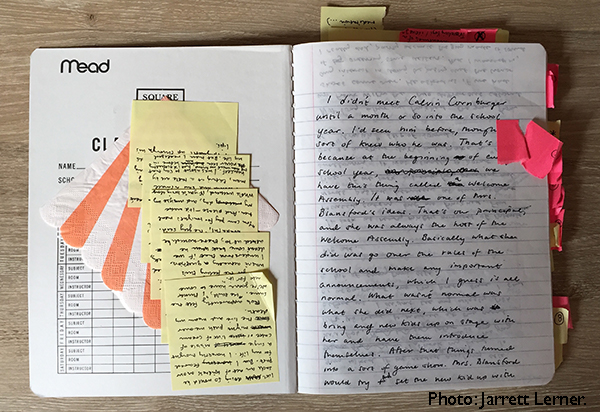
There are scribbles, doodles, scores of Post-it notes, giant frustrated Xes, crisscrossing arrows, paperclipped-in additions. I call the things “word vomit,” and that’s because they’re sloppy and embarrassing – I’d never want anyone to actually try and read one of those first drafts – BUT, more/most importantly, word-vomiting is a natural thing that everyone has to once in a while do. ALL writers go through the word vomit phase.
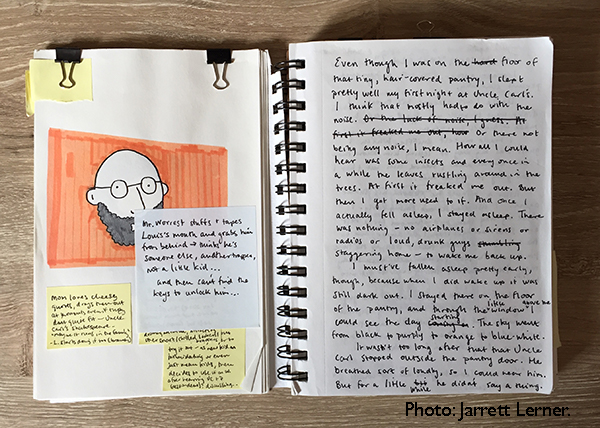
Writing is revising . . . and revising and revising and revising and revising. I find that lots of kids look at published authors as people who can sit down and, in a day or two, crank out a publishable book. Pulling back the curtain and showing them that this is far (very far) from the truth can be an eye-opening, inspiring, and empowering thing for young writers especially.
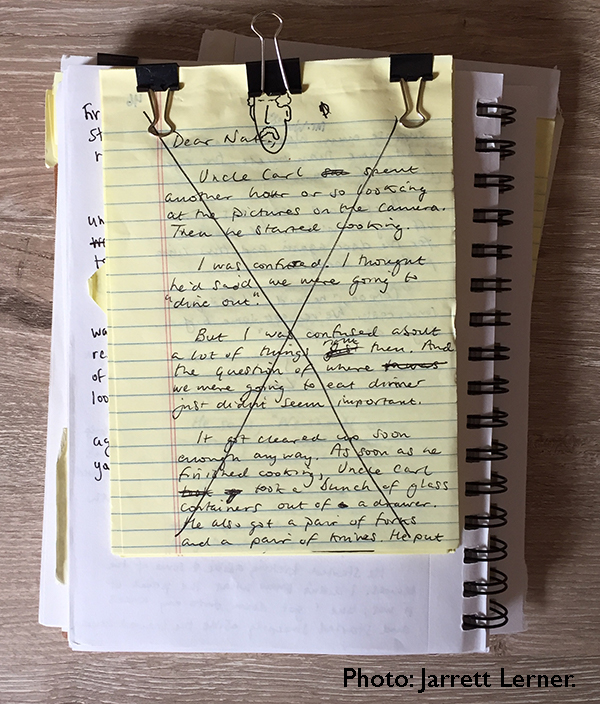
One other thing I always encourage young writers to do: seek out kind, caring people with similar interests and share your work with them. It can be nerve-racking, even terrifying to do so. But the experience is an invaluable one. It’ll not only help kids see their writing from a different perspective, but will, perhaps even more importantly, get them comfortable making themselves vulnerable in this way. It’ll help them learn how to handle feedback, both the positive and negative, and, if they are serious about wanting to make a life for themselves in writing, it’ll harden their resolve to keep striving despite bad days and setbacks.
Because becoming a published author requires talent, certainly – but more than that, it requires a tremendous amount of perseverance. You have to work hard – but also be (or have your work be) in the right place at the right time.
There is, for better or worse, a lot of luck involved. Sharing your work and taking seriously the feedback you get will help improve that work, and the more often you put both it and yourself out there, the better your chances are that luck will be on your side.
Q. What are you excited about right now?
I’m excited about some upcoming book projects and future events – but without a doubt the thing I’m MOST excited about is having recently become a father. I’ve already begun filling my daughter’s life (and bedroom shelves!) with books. I read to her every night, and often during the day too. It’s just plain amazing.
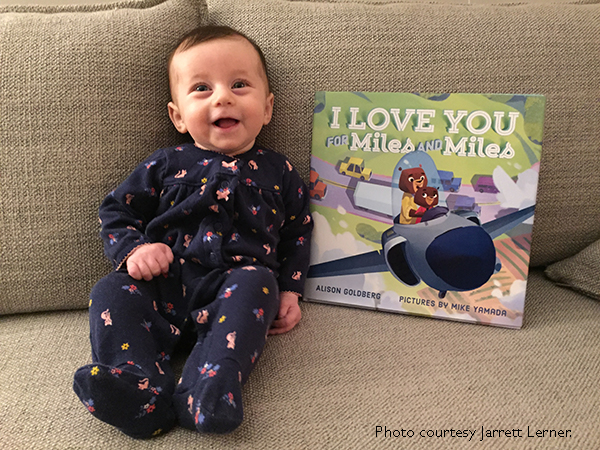
What’s more, my daughter’s presence, her simply being in the world, has totally changed the way I approach reading and writing. After finishing a book, I find myself wondering whether it’s one I’ll want to share with her, either now or later on, when she can read it herself.
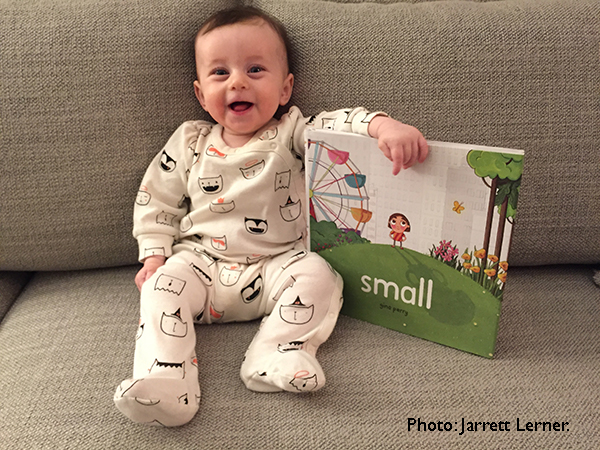
Sharing stories with her has, in a profound way, confirmed and even strengthened all my beliefs about the power of stories and storytelling. It’s made me think harder – and, I believe, think better – about the stories I spend my time telling, about the books I’m writing now and plan to write in the future.
For more insights from book creators, see my Inkygirl Interview Archives and Advice For Young Writers And Illustrators From Book Creators.

